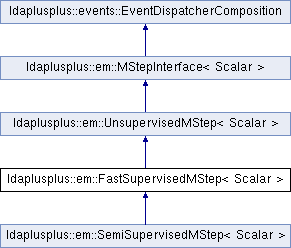|
LDA++
|
|
LDA++
|
#include <FastSupervisedMStep.hpp>

Public Member Functions | |
| FastSupervisedMStep (size_t m_step_iterations=10, Scalar m_step_tolerance=1e-2, Scalar regularization_penalty=1e-2) | |
| virtual void | m_step (std::shared_ptr< parameters::Parameters > parameters) override |
| virtual void | doc_m_step (const std::shared_ptr< corpus::Document > doc, const std::shared_ptr< parameters::Parameters > v_parameters, std::shared_ptr< parameters::Parameters > m_parameters) override |
 Public Member Functions inherited from ldaplusplus::events::EventDispatcherComposition Public Member Functions inherited from ldaplusplus::events::EventDispatcherComposition | |
| std::shared_ptr< EventDispatcherInterface > | get_event_dispatcher () |
| void | set_event_dispatcher (std::shared_ptr< EventDispatcherInterface > dispatcher) |
Implement the M step for the fsLDA.
Similarly to the UnsupervisedMStep the purpose is to maximize the lower bound of the log likelihood \(\mathcal{L}\). The same notation as in UnsupervisedMStep is used.
\[ \log p(w, y \mid \alpha, \beta, \eta) \geq \mathcal{L}(\gamma, \phi \mid \alpha, \beta, \eta) = \mathbb{E}_q[\log p(\theta \mid \alpha)] + \mathbb{E}_q[\log p(z \mid \theta)] + \mathbb{E}_q[\log p(w \mid z, \beta)] + H(q) + \mathbb{E}_q[\log p(y \mid z, \eta)] \]
We observe that with respect to the parameter \(\beta\) nothing changes thus FastSupervisedMStep extends UnsupervisedMStep to delegate part of the maximization to it. Decoration or another type of composition may be a more appropriate form of code reuse in this case.
To maximize with respect to \(\eta\) we use the following equation which amounts to simple logistic regression. The reasons for this approximation are explained in our ACM MM '16 paper (to be linked when published).
\[ \mathcal{L}_{\eta} = \sum_d^D \eta_{y_d}^T \left(\frac{1}{N} \sum_n^{N_d} \phi_{dn}\right) - \sum_d^D \log \sum_{\hat y}^C \text{exp}\left( \eta_{\hat y}^T \left(\frac{1}{N} \sum_n^{N_d} \phi_{dn}\right) \right) \]
This implementation maximizes the above equation using batch gradient descent with ArmijoLineSearch.
|
inline |
| m_step_iterations | The maximum number of gradient descent iterations |
| m_step_tolerance | The minimum relative improvement between consecutive gradient descent iterations |
| regularization_penalty | The L2 penalty for logistic regression |
|
overridevirtual |
Delegate the collection of some sufficient statistics to UnsupervisedMStep and keep in memory \(\mathbb{E}_q[\bar z_d] = \frac{1}{N} \sum_n^{N_d} \phi_{dn}\) for use in m_step().
| doc | A single document |
| v_parameters | The variational parameters used in m-step in order to maximize model parameters |
| m_parameters | Model parameters, used as output in case of online methods |
Reimplemented from ldaplusplus::em::UnsupervisedMStep< Scalar >.
Reimplemented in ldaplusplus::em::SemiSupervisedMStep< Scalar >.
|
overridevirtual |
Maximize the ELBO w.r.t. to \(\beta\) and \(\eta\).
Delegate the maximization regarding \(\beta\) to UnsupervisedMStep and maximize \(\mathcal{L}_{\eta}\) using gradient descent.
| parameters | Model parameters (changed by this method) |
Reimplemented from ldaplusplus::em::UnsupervisedMStep< Scalar >.
 1.8.11
1.8.11